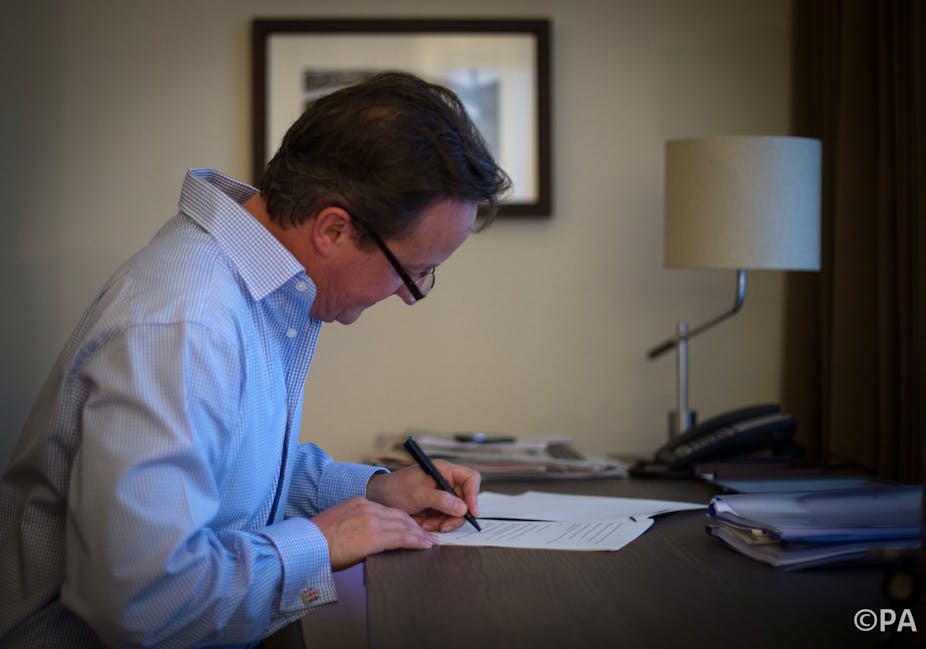David Cameron made a play for Eurosceptic hearts during his speech to the Conservative Party conference by promising to put the free movement of EU citizens at the heart of his renegotiation strategy in Europe. But Cameron kept the detail on this pledge light for a very good reason. Cutting the number of European migrants coming to the UK is not a realistic prospect. Hurdles await him at every turn. He has four options when he negotiates with Brussels and really only one that will be workable.
Cameron’s promise is driven by the threat posed by UKIP. Nigel Farage’s party has tapped into anti-immigration feelings and has linked them to their opposition to EU membership. Migration from other member states has become the main flow into Britain and has occurred at a far higher rate than anticipated back when the EU’s membership increased to include countries from central and eastern Europe in 2004.
Office for National Statistics’ data shows that net migration to Britain increased from 175,000 to 243,000 between August 2013 and August 2014, with two-thirds of this increase accounted for by EU member states. As numbers have risen, so too has opposition to immigration. The 2014 British Social Attitudes Survey revealed that 77% of respondents wanted to see immigration reduced either by a little or a lot.
The first of Cameron’s four options – and the least likely, given the current lie of the political land – would be to embrace free movement. This is completely counter to Cameron’s current rhetoric but actually fits with his party’s preference for a more liberal, deregulated Europe. Backing away from free movement could open the door for other member states that want to chip away at free movement for goods, capital and services, which the Conservatives don’t want.
On top of this, more than a million Britons currently live in another EU member state, enjoying the protection of EU law and the rights extended to EU citizens. They study at European universities or retire to the southern European sunshine and continue to pick up a pension and access healthcare.
Hard to get tough
The second option would be to change the EU legal framework to restrict the movement of citizens. This would be a Herculean task. Changing the treaty that governs Europe would require agreement from all member states and referendums in many. Changing EU laws requires mustering a coalition of other member states, Jean-Claude Juncker’s Commission and a majority in the European Parliament. Even in the unlikely circumstances of this coalition being assembled, any change would need to withstand a challenge to the EU’s Court of Justice.
A third option would be to toughen the implementation of the rules in the UK. Changes to welfare rules introduced earlier this year require that EU citizens seeking worker status in the UK need to earn at least £150 per week for at least three months in order to qualify for access to child benefits, child tax credits, jobseeker’s allowance and housing benefit. In a speech last June in Berlin, the work and pensions secretary, Iain Duncan Smith, called for further restrictions by prohibiting transfer by EU citizens of child benefits back to their countries of origin.
The fourth option is to exit the EU altogether, but even this would require a hugely complex renegotiation. Even those who want to exit also want to maintain access to trade ties and the UK will need to continue to meet requirements on the rights of EU citizens in the UK and, of course, the million or so Brits living in the EU.
So to achieve change within Europe, or even to leave it, Cameron would have to navigate some very daunting negotiations. He is most likely to take the option of tightening rules on access to benefits for EU citizens in the UK and restricting the right of free movement for people from countries that join the EU in the future, including Serbia, Montenegro and perhaps Turkey. These outcomes may not be the thoughts that Cameron triggered in people’s mind when he spoke of getting what Britain needs on free movement, but it may be what he ends up with.

